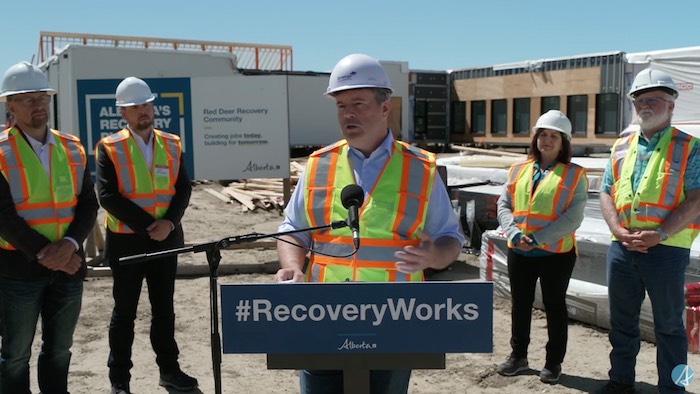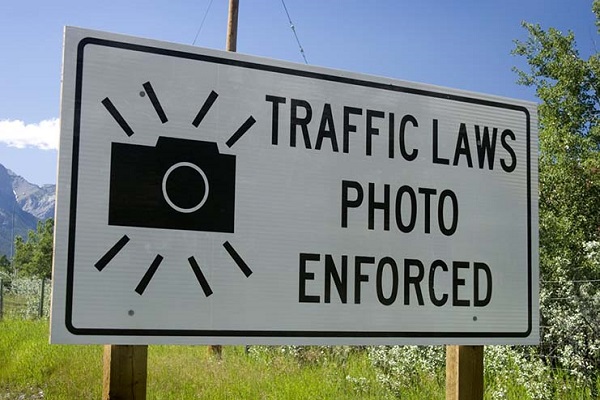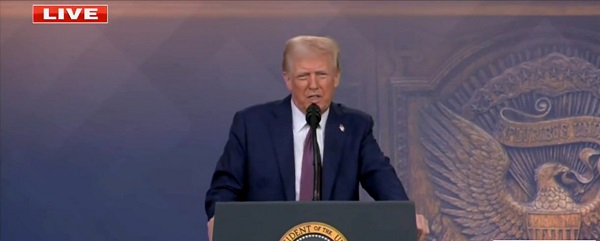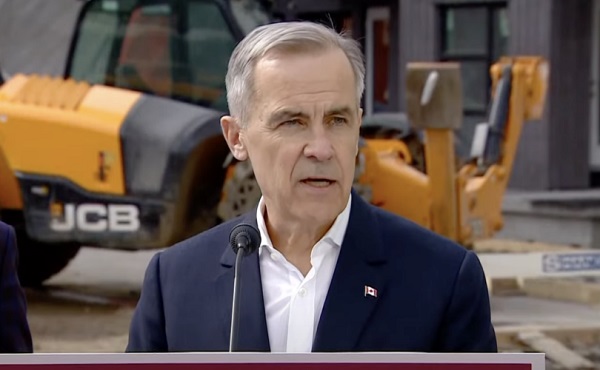Alberta
Red Deer recovery community slated for fall completion

Construction on the 75-bed recovery community project in Red Deer is on time and on budget and is expected to be completed this fall.
The Red Deer recovery community is a first-of-its-kind project in Alberta that will house a long-term addiction treatment program focused on helping people pursue recovery.
Currently 52 of 72 modular buildings are on site. The installation of mechanical and electrical systems as well as work on the building interiors are scheduled to get underway later this month. The final modular buildings will be arriving soon.
“Alberta’s government is making sure that every Albertan has the opportunity to pursue recovery from the devastating and destructive illness of addiction. I am pleased that this project is on time to start operations in the fall so that Albertans can begin their recovery as soon as possible.”
“Alberta Infrastructure plays a key role in delivering this essential project. Our goal is to have this facility up and running as soon as possible to bring more jobs and specialized care to the people of Red Deer.”
“Addiction and mental health challenges have taken a significant toll on central Alberta over the past decade. Increasing treatment capacity in Red Deer is long overdue. Alberta’s government is proud to make this investment to save lives, support recovery and bring hope to the community of Red Deer.”
“The Red Deer recovery community will be an important part of the recovery-oriented system of care that we are building in Red Deer to help people improve their lives. Our government is proud to invest in projects like this to build up our communities and bring more jobs to Albertans.”
“It is essential that our community have access to quality mental health care. This project will not only expand access to addictions treatment for those in need, but it will also bring jobs to our city and help boost our economic recovery.”
Recovery communities are a form of long-term residential treatment that focus on supporting people who are pursuing recovery. Recovery is seen as a gradual, ongoing process of behavioural change through clinical and peer interventions aimed at improving a person’s overall well-being.
Alberta’s government is helping Albertans access life-saving addiction and mental health-related prevention, intervention, treatment and recovery resources.

Quick facts
- This project is keeping Albertans working, supporting about 135 well-paid construction and construction-related jobs.
- Alberta Health is in the process of opening four recovery community projects.
- Red Deer (75-bed facility)
- Construction slated for fall completion.
- Lethbridge (50-bed facility)
- Groundbreaking took place in May 2022 and the project is on schedule to be completed in late 2022.
- Gunn (100-bed facility)
- The project is in the design stage. Construction and completion dates will be determined as the project progresses.
- Blood Tribe (75-bed facility)
- The project is in the planning phase.
- Red Deer (75-bed facility)
- Contact Alberta 211 for information about addiction treatments and supports available throughout the province.
- Albertans struggling with opioid use anywhere in the province can call the Virtual Opioid Dependency Program seven days a week at 1-844-383-7688 to access same-day treatment.
- Albertans using substances at home alone can download the DORS app to a smartphone free of charge from any app store or via DORSApp.ca. When using the app, Albertans will receive a call from the STARS emergency centre if they become unresponsive to a timer. If an overdose is suspected, STARS will immediately dispatch emergency medical services to the person’s location.
Alberta
Province announces plans for nine new ‘urgent care centres’ – redirecting 200,000 hospital visits

Expanding urgent care across Alberta
If passed, Budget 2025 includes $17 million in planning funds to support the development of urgent care facilities across the province.
As Alberta’s population grows, so does the demand for health care. In response, the government is making significant investments to ensure every Albertan has access to high-quality care close to home. Currently, more than 35 per cent of emergency department visits are for non-life-threatening conditions that could be treated at urgent care centres. By expanding these centres, Alberta’s government is enhancing the health care system and improving access to timely care.
If passed, Budget 2025 includes $15 million to support plans for eight new urgent care centres and an additional $2 million in planning funds for an integrated primary and urgent care facility in Airdrie. These investments will help redirect up to 200,000 lower-acuity emergency department visits annually, freeing up capacity for life-threatening cases, reducing wait times and improving access to care for Albertans.
“More people are choosing to call Alberta home, which is why we are taking action to build capacity across the health care system. Urgent care centres help bridge the gap between primary care and emergency departments, providing timely care for non-life-threatening conditions.”
“Our team at Infrastructure is fully committed to leading the important task of planning these eight new urgent care facilities across the province. Investments into facilities like these help strengthen our communities by alleviating strains on emergency departments and enhance access to care. I am looking forward to the important work ahead.”
The locations for the eight new urgent care centres were selected based on current and projected increases in demand for lower-acuity care at emergency departments. The new facilities will be in west Edmonton, south Edmonton, Westview (Stony Plain/Spruce Grove), east Calgary, Lethbridge, Medicine Hat, Cold Lake and Fort McMurray.
“Too many Albertans, especially those living in rural communities, are travelling significant distances to receive care. Advancing plans for new urgent care centres will build capacity across the health care system.”
“Additional urgent care centres across Alberta will give Albertans more options for accessing the right level of care when it’s needed. This is a necessary and substantial investment that will eventually ease some of the pressures on our emergency departments.”
The remaining $2 million will support planning for One Health Airdrie’s integrated primary and urgent care facility. The operating model, approved last fall, will see One Health Airdrie as the primary care operator, while urgent care services will be publicly funded and operated by a provider selected through a competitive process.
“Our new Airdrie facility, offering integrated primary and urgent care, will provide same-day access to approximately 30,000 primary care patients and increase urgent care capacity by around 200 per cent, benefiting the entire community and surrounding areas. We are very excited.”
Alberta’s government will continue to make smart, strategic investments in health facilities to support the delivery of publicly funded health programs and services to ensure Albertans have access to the care they need, when and where they need it.
Budget 2025 is meeting the challenge faced by Alberta with continued investments in education and health, lower taxes for families and a focus on the economy.
Quick facts
- The $2 million in planning funds for One Health Airdrie are part of a total $24-million investment to advance planning on several health capital initiatives across the province through Budget 2025.
- Alberta’s population is growing, and visits to emergency departments are projected to increase by 27 per cent by 2038.
- Last year, Alberta’s government provided $8.4 million for renovations to the existing Airdrie Community Health Centre.
Related information
Alberta
Province pumping $100 million into Collegiates and Dual-Credit hands-on learning programs

Alberta’s government is helping students discover their skills and interests today, to help them find careers for tomorrow.
If passed, Budget 2025 will provide more than $100 million over three years for school boards to grow career education programs, including funding for more collegiate and dual-credit programs across Alberta.
“We are working to set students up for success by strengthening job-focused education. This money is helping schools partner with businesses, universities and colleges to create programs that will help students hit the ground running after they graduate.”
Career education helps students gain credits towards graduation while earning hands-on experience in fields like the trades, computer programming, health care, agriculture, culinary arts and more. These career education programs support a strong economy by helping students learn the skills they need to get in-demand jobs.
Collegiate schools
Collegiate schools work with businesses, universities and colleges to offer classes that give students pathways to education and careers in the job of their choice. There are 12 collegiate schools in Alberta, offering many different types of programming for grades 7-12, including aviation, graphic design, trades and more.
If passed, Budget 2025 provides more than $21 million to school boards to help fund special classrooms like carpentry workshops, film and media rooms, science laboratories, heavy equipment simulators and aircraft hangars. Another $6 million is being invested to support the start-up costs for new collegiate schools.
Dual-credit programs
Budget 2025, if passed, also provides $4.6 million in 2025/26 to start new or improve existing dual-credit programs. In partnership with universities and colleges, dual-credit programs give students a head start on rewarding careers by allowing them to earn high-school and post-secondary credits at the same time. Of the $4.6 million, $550,000 is being provided by Alberta Seniors, Community and Social Services for new and improved dual-credit health care aide programs.
“Health care aides play a critical role in ensuring Albertans receive the continuing care services they need to maintain their health, independence and quality of life. Our investments into career pathways for health care aides will provide opportunities for young Albertans to develop the skills they need to build a rewarding career in Alberta’s continuing care workforce.”
Another $1.4 million is being invested to support students participating in off-campus career education programs through CAREERS. This non-profit connects students to jobs in high-demand fields, such as the trades, technology, health, forestry and agriculture.
“Investments in collegiate and dual-credit programming are significant for Calgary Catholic as they further strengthen our collegiate and dual-credit programming. This programming will open opportunities for our students and help them to realize their full potential.”
“Before Fusion Collegiate, I felt lost and wasn’t really sure what to do after high school. Thanks to its career-focused learning and the opportunities through Fusion and The Educational Partnership Foundation, I’m now working as a first-year apprentice plumber with Mr. Rooter. The hands-on trades training, high school credits, safety certifications, and real-world skills I picked up completely changed my life. I’m excited about where my career is headed and really thankful for the support that helped me get here.”
Budget 2025 is meeting the challenge faced by Alberta communities with continued investments in education and health, lower taxes for families and a focus on the economy.
Quick facts
- If passed, Budget 2025 invests $102.4 million over three years to provide sustainable, predictable career education funding, and to increase access to career education for Alberta students.
- This includes $8.4 million over 2026-27 and 2027-28 to raise awareness among students and families of career education programs and pathways available to Alberta students.
- Career education in Alberta includes career and technology courses, Career and Life Management (CALM), dual-credit courses, collegiate schools, apprenticeships and off-campus education programming.
- Since 2013, more than 95,000 high school students participated in at least one dual–credit course.
- In spring 2025, Alberta Education will engage with education partners on best practices to bring more career education opportunities to students.
- Since 2022, education partners and almost 5,000 Albertans have provided their feedback on career education and workforce needs.
Related information
-

 Business22 hours ago
Business22 hours agoFeds Spent Roughly $1 Billion To Conduct Survey That Could’ve Been Done For $10,000, Musk Says
-

 2025 Federal Election1 day ago
2025 Federal Election1 day agoChinese Gangs Dominate Canada: Why Will Voters Give Liberals Another Term?
-

 Health12 hours ago
Health12 hours agoRFK Jr. Drops Stunning Vaccine Announcement
-

 Alberta10 hours ago
Alberta10 hours agoPhoto radar to be restricted to School, Playground, and Construction Zones as Alberta ends photo radar era
-

 Alberta4 hours ago
Alberta4 hours agoProvince announces plans for nine new ‘urgent care centres’ – redirecting 200,000 hospital visits
-

 Energy1 day ago
Energy1 day agoEnergy, climate, and economics — A smarter path for Canada
-

 2025 Federal Election2 days ago
2025 Federal Election2 days agoFool Me Once: The Cost of Carney–Trudeau Tax Games
-

 Business1 day ago
Business1 day agoTrump Reportedly Shuts Off Flow Of Taxpayer Dollars Into World Trade Organization





